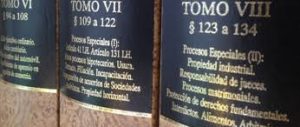 Although the Spanish courts are competent to know of a divorce procedure, the legislation to be applied for its resolution will not always be Spanish.
Although the Spanish courts are competent to know of a divorce procedure, the legislation to be applied for its resolution will not always be Spanish.
The following should be taken into account:
Article 107 of the Civil Code indicates that the legal divorce will be governed by the rules of the European Union or Spanish of private international law ”
In this way, in the case of referral to European legislation, we must be prepared to:
- Council Regulation (UE) No 1259/2010 of 20 December 2010 establishing enhanced cooperation within the scope of the law applicable to divorce and judicial separation.
- The art. 5 of the regulation indicates that the spouses may agree to designate the law applicable to divorce and judicial separation, provided that it is one of the following laws:
- The law of the State in which the spouses have their habitual residence at the time of the conclusion of the Convention (mutual agreement).
- The law of the State of the last place of habitual residence of the spouses, provided that one of them still resides there at the time when the Convention(mutual agreement) is concluded.
- Legislation of the State whose nationality is one of the spouses at the time the Convention (mutual agreement) is concluded
- The art. 5 of the regulation indicates that the spouses may agree to designate the law applicable to divorce and judicial separation, provided that it is one of the following laws:
In conclusion, and taking into account the foregoing, the spouses may decide that their divorce is governed by legislation other than Spanish, provided there is a minimum connection between the rules and marriage.
In the absence of election, in general terms, the legislation in force in Spain will have to be applied.
Spanish divorce legislation.
The Law of 7 July 1981 legalized divorce in Spain again, after a parenthesis of more than 40 years.
The previous law was supplanted by law 15/2005, of 8 July, which amended the regulation of divorce.
With the new regulation:
- If one of the spouses does not wish to continue to be married, it is sufficient to express his will, without the other spouse being able to oppose.
- Disappear, therefore, the existence of the causes justifying the decision to request it, such as infidelity, unjustified abandonment of the home, alcoholism, or others, which were demanded before the entry into force of the law regulating it.
- Another of the innovations introduced in the current procedure is the elimination of the temporality of the marriage separation, as a previous step for the initiation of the same:
- Couples will be able to get a divorce directly, once the three-month period has elapsed since they married.
- Couples will be able to get a divorce directly, once the three-month period has elapsed since they married.
Finally, law 15/2015 of July 2, regulating the voluntary jurisdiction introduced as a novelty, the possibility of divorcing before a notary in order to agiliar the process.
This notarial divorce can only take place when the following three situations are taken together:
- There are No common children under age.
- Mutual agreement between the spouses on eventual compensatory pensions.
- Non-existence of goods to be shared as a result of the liquidation of the matrimonial economic regime.
AYUDADIVORCIO.ES is a service of Eban Abogados.

